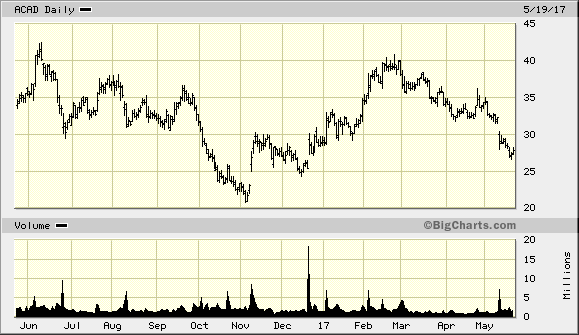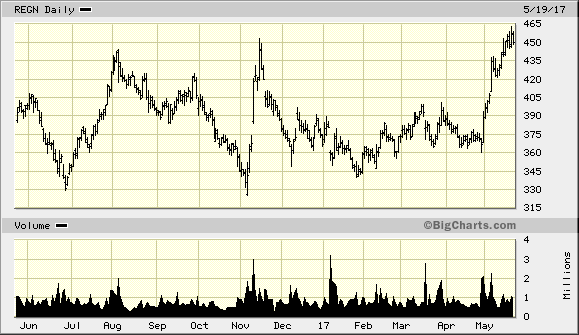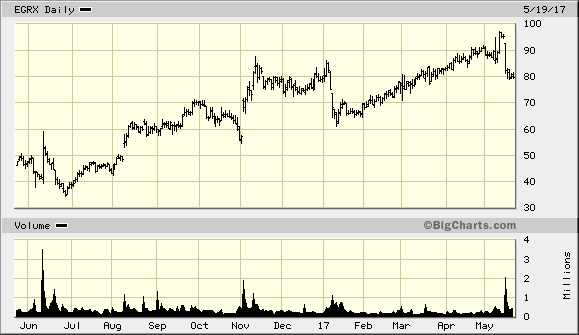3 Top Biotech Stocks to Buy in 2017 Says Motley Fool
Acadia Pharmaceuticals ( ACAD NASDAQ ) has
been a home run stock over the last few years thanks to
investor enthusiasm around its drug Nuplazid. Nuplazid is
the first and only Food and Drug Administration-approved
treatment for Parkinson's disease psychosis, or PDP, a
condition that causes hallucinations and delusions. Since
caring for the patients who develop PDP is extremely
difficult, the demand for Nuplazid is expected to be huge.
While we are still early into the launch of Nuplazid, the
initial results are encouraging. Total sales reached $17
million in 2016, which is a solid result given that the drug
only launched halfway through the year. In 2017, market
watchers expect this figure to exceed $89 million thanks to
growing awareness among providers and better reimbursement
access.
However, what makes Acadia such a compelling investment is
that the company believes that Nuplazid can also be useful
in a handful of other conditions. This includes major
diseases such as schizophrenia, Alzheimer's disease, and
even major depression.
Even though success in these other indications is far from
guaranteed, we think the company's odds are better than
average. After all, the FDA already gave Nuplazid the
thumbs-up for treating PDP, . If all goes well, then peak
sales of Nuplazid could cross the multibillion-dollar mark,
which would easily justify a higher valuation.
Todays Best Performing Stocks

Regeneron Pharmaceuticals ( NASDAQ REGN )
has been one of the best-performing stocks of the past
decade, and for good reason. Regeneron owns a megahit drug
called Eylea, which treats age-related macular degeneration,
macular edema, and diabetic retinopathy. Eylea's 2016
worldwide sales topped $5 billion, making it one of the
best-selling drugs on the planet.
Despite Eylea's success, Regeneron's shares have been
running in reverse for nearly two years. Why? You can blame
the downfall on a handful of clinical, regulatory,
and legal setbacks.
In particular, Regeneron is on the losing side of a
courtroom battle with Amgen related
to Regeneron's new cholesterol-lowering drug Praluent. In
January, a U.S. District Court sided with Amgen and blocked
the marketing of Praluent in the U.S. While a stay of the
injunction was granted, the future of this hopeful
blockbuster drug is up in the air.
While potentially losing out on Praluent sales in the U.S.
would be a big blow, Regeneron has a few other drugs coming
to market soon that promise to reverse the company's
fortunes. This includes Dupixent, an eczema drug candidate,
and Kevzara, a potential treatment for rheumatoid arthritis.
Both of these drugs are up for FDA approval in 2017 and
could go a long way toward reigniting top-line growth.
In total, Wall Street expects Eylea and these new drugs to
power bottom-line growth of nearly 19% annually for the
foreseeable future. That's an attractive growth rate for a
company that is only trading for 28 times forward earnings
estimates.

Eagle
Pharmaceuticals ( NASDAQ EGRX ) a specialty
pharmaceutical company focused on the critical care and oncology
markets. However, unlike traditional drug developers, Eagle
isn't focused on developing brand-new molecules. Instead, the
company's strategy is to take drugs that have already been
approved and make them better. This strategy is much less
expensive and risky than traditional drug development.
Eagle's current cash cow is a drug called Bendeka.
This compound is a rapid-acting formulation of Teva
Pharmaceutical's cancer drug Treanda.
Eagle won FDA approval for Bendeka and licensed the drug
to Teva in exchange for a $30 million up-front payment and up to
$90 million in milestone payments, plus a 25% royalty on any
sales.
Teva jumped at this deal since Treanda is a highly profitable
drug that lost patent protection. Licensing Bendeka allows the
company to remain relevant in this highly lucrative market.
Bendeka is clearly a winner -- Eagle states that the drug
already boasts a market share of 92%. That fact puts Eagle in
great shape to earn all of its milestone payments and big
royalties for years to come.
Ryanodex, Eagle's other drug of interest, is a treatment
for malignant hyperthermia. While sales of this drug
are still small, Eagle has submitted Ryanodex to the FDA as a
treatment for exertional heat stroke and is researching it as a
treatment for drug-induced hyperthermia. Winning label expansion
claims in either indication could help to spur strong sales
growth from here.
Analysts
expect Eagle to churn out profit growth of roughly 15% annually
over the coming years. That's not too shabby for a company that
is trading at 17 times trailing earnings.

About BioTechReporter.net
:
BioTechReporter.net is
a subsidiary
of Target Publishing Inc, and is a leading publisher
of todays market and investment news, commentary,
proprietary research and videos from seasoned
journalists, analysts and contributors covering the
financial markets and global economies. Leveraging
our extensive distribution network and social media
presence, we have cultivated
a valuable audience of
engaged market enthusiasts, which in turn
delivers a variety of unique opportunities for
industry partnerships, corporate communications,
market exposure and investment.
A complete disclaimer can be viewed HERE |
|
